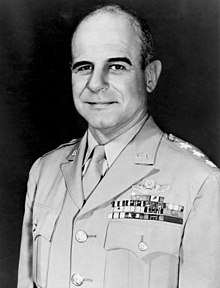
Back جيمس دوليتل Arabic جيمس دوليتل ARZ Jimmy Doolittle Czech James Harold Doolittle Danish James Harold Doolittle German James H. Doolittle Spanish جیمی دولیتل Persian James H. Doolittle Finnish James H. Doolittle French ג'יימס דוליטל HE
James Doolittle | |
|---|---|
 General James Harold Doolittle | |
| Born | December 14, 1896 Alameda, California, U.S. |
| Died | September 27, 1993 (aged 96) Pebble Beach, California, U.S. |
| Buried | |
| Allegiance | United States |
| Service/ | United States Army (1917–1918) United States Army Air Corps (1918–1941) United States Army Air Force (1941–1947) United States Air Force (1947–1959) |
| Years of service | 1917–1959 |
| Rank | General (Honorary) |
| Commands held | Eighth Air Force Fifteenth Air Force Twelfth Air Force |
| Battles/wars | World War I Mexican Border Service World War II |
| Awards | Medal of Honor Army Distinguished Service Medal (2) Silver Star Distinguished Flying Cross (3) Bronze Star Medal Air Medal (4) Presidential Medal of Freedom |
| Spouse(s) |
Josephine Daniels
(m. 1917; died 1988) |
| Children | 2 |
| Other work | Air race pilot, test pilot, Shell Oil Company VP and director, chairman of Space Technology Laboratories and NACA |
James Harold Doolittle (December 14, 1896 – September 27, 1993) was an American military general and aviation pioneer who received the Medal of Honor for his raid on Japan during World War II, known as the Doolittle Raid in his honor.[1] He made early coast-to-coast flights, record-breaking speed flights, won many flying races, and helped develop flight-test instrument flying.[2]
Doolittle grew up in Nome, Alaska. He attended the University of California, Berkeley, where he graduated with a Bachelor of Arts in 1922. That year, he made the first cross-country flight in an Airco DH.4, and in 1925, was awarded a doctorate in aeronautics from the Massachusetts Institute of Technology, the first such doctorate degree issued in the United States.[2][3] In 1927, he performed the first outside loop, thought at the time to be a fatal aerobatic maneuver, and two years later, in 1929, pioneered the use of "blind flying", where a pilot relies on flight instruments alone, which later won him the Harmon Trophy and made all-weather airline operations practical.
Doolittle was a flying instructor during World War I and a reserve officer in the United States Army Air Corps, but was recalled to active duty during World War II. He was awarded the Medal of Honor for personal valor and leadership as commander of the Doolittle Raid, a bold long-range retaliatory air raid on some of the Japanese main islands on April 18, 1942, four months after the attack on Pearl Harbor. The raid used 16 B-25B Mitchell medium bombers with reduced armament to decrease weight and increase range, each with a crew of five and no escort fighter aircraft. It was a major morale booster for the United States and Doolittle was celebrated as a hero, making him one of the most important national figures of the war.
Doolittle was promoted to lieutenant general and commanded the Twelfth Air Force over North Africa, the Fifteenth Air Force over the Mediterranean, and the Eighth Air Force over Europe. He retired from the Air Force in 1959 but remained active in many technical fields. Doolittle was inducted into the National Aviation Hall of Fame in 1967, eight years after retirement and only five years after the Hall was founded. He was eventually promoted to general in 1985, presented to him by President Ronald Reagan 43 years after the Doolittle Raid.[4] In 2003, he topped Air & Space/Smithsonian magazine's list of the greatest pilots of all time, and ten years later, Flying magazine ranked Doolittle sixth on its list of the 51 Heroes of Aviation.[5][6] He died in 1993 at the age of 96, and was buried at Arlington National Cemetery.
- ^ Fogerty, Robert P. (1953). "Biographical Data on Air Force General Officers, 1917-1952, Volume 1 – A thru L" (PDF). Air Force Historical Research Agency. pp. 476–480. USAF historical studies: no. 91. Archived (PDF) from the original on August 31, 2021. Retrieved November 9, 2021.
- ^ a b "General James Harold Doolittle > U.S. Air Force > Biography Display". www.af.mil. Retrieved July 6, 2019.
- ^ "Gen. Jimmy Doolittle Dies; War Hero, Aviation Pioneer : Flight: The celebrated ace, who grew up on the L.A. streets, was 96. He led daring 1942 Tokyo bombing raid". Los Angeles Times. September 28, 1993. ISSN 0458-3035. Retrieved July 6, 2019.
- ^ "Jimmy Doolittle Given Fourth Star by Reagan". Associated Press. June 14, 1985 – via LA Times.
- ^ Cite error: The named reference
AirSpaceMagwas invoked but never defined (see the help page). - ^ Cite error: The named reference
FlyingMagwas invoked but never defined (see the help page).
© MMXXIII Rich X Search. We shall prevail. All rights reserved. Rich X Search